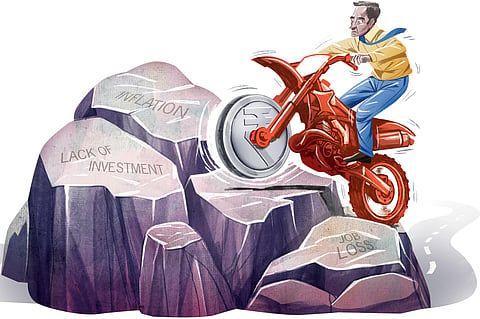

Your money does not grow in a linear format. There is always a cycle of growth. You constantly face headwinds, and navigating the times of high inflation is your biggest challenge. Financial markets could see some turbulence with the consumer price inflation rate at a five-month high in India. This column had earlier in October 2021 flagged the risk of stagflation. That means a phase of high inflation and slow growth. With the onslaught of Omicron infections surging, it becomes a reality.
The inflation demon
This column has often highlighted the risk of inflation to your money. Inflation leads to higher interest rates and slow economic growth. It effectively hurts businesses as expansion is affected. That hurts the stock market sentiment. A phase of higher inflation usually leads to weaker equity markets. However, India is not the only country facing challenges. According to the latest Global Economic Prospects report published by the World Bank, the world faces risks due to slow growth and supply chain bottlenecks.
“After rebounding to an estimated 5.5% in 2021, global growth is expected to decelerate markedly to 4.1% in 2022, reflecting continued Covid-19 flare-ups, diminished fiscal support, and lingering supply bottlenecks,” said the report.
In India, the World Bank is relatively optimistic than the rest of the world. There is no change in the growth outlook for India in 2021-22. For 2022-23, the World Bank has upgraded the growth outlook to 8.7%. The global lender expects an improved investment outlook with private investment following the production-linked incentives offered by the government to manufacturers.However, that does not take away the inflation threat. Most analysts expect the Reserve Bank of India to raise borrowing rates later this year.
What does it mean to invest
Nobody can guarantee returns. The government offers the only guaranteed return in the public provident fund or employee provident fund. The other option is buying government bonds. Your investments in equity markets carry a risk at all times. At the same time, there is an upside from the superior gains over the long term. If you are new to investing, you must begin or continue to invest through index funds or diversified equity mutual funds. A lot of new investors are buying equity shares directly.
Unless you have enough knowledge or research at your disposal, that could be a risky proposition. Investing in equities should be aligned with your long-term financial goals. Some individuals set aside money regularly in the public provident fund or PPF with a particular purpose in mind. Similarly, some regularly invest in blue-chip companies over 10-15 years to achieve their financial goals.
You must get professional help to decide your asset allocation appropriately. Such an advisor can help you choose the right investment vehicle. The rising inflation rate may make risk-taking in equities unattractive for institutional investors. However, some companies tend to do better in an inflationary environment. For example, companies that focus on exports of technology services are unaffected by the inflation in India. They cater to large companies’ technology and business needs in the US and Europe.
They are inflation-proof.
The other sector is the consumer goods companies. They tend to pass on rising input costs to consumers as inflation is everywhere. That helps them maintain their profit margins. Even if there is a slowdown, people do not stop consuming food and other household essentials. The other sector immune to inflation is the pharmaceuticals sector. There is an increasing demand for medicines and healthcare. That is perhaps why the consumer and pharmaceutical sectors are called defensives.
There could be times when you may not want to take risks and keep your money in fixed income securities that offer marginally higher returns.However, with higher inflation, you could see the value of your money dwindle. Appropriate asset allocation is the mantra. You need to ensure that your investible surplus is invested right in the direction of your long-term financial goals.
(The author is editor-in-chief at www.moneyminute.in)